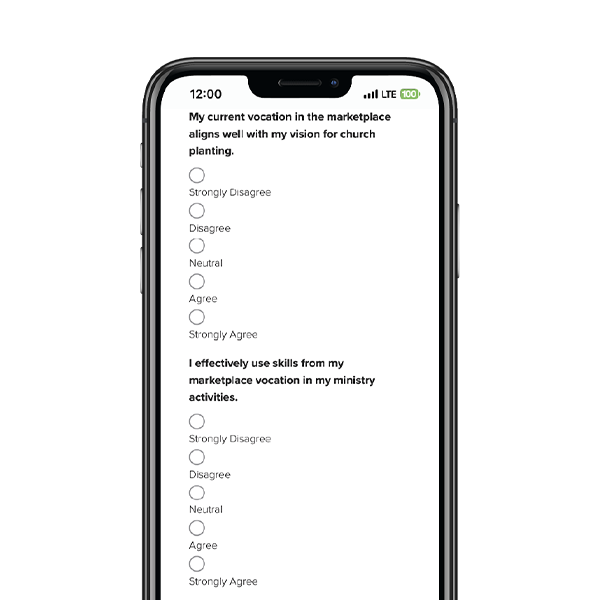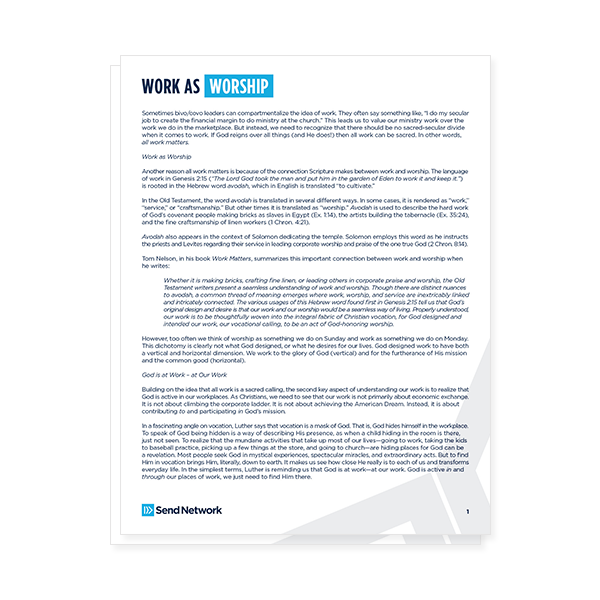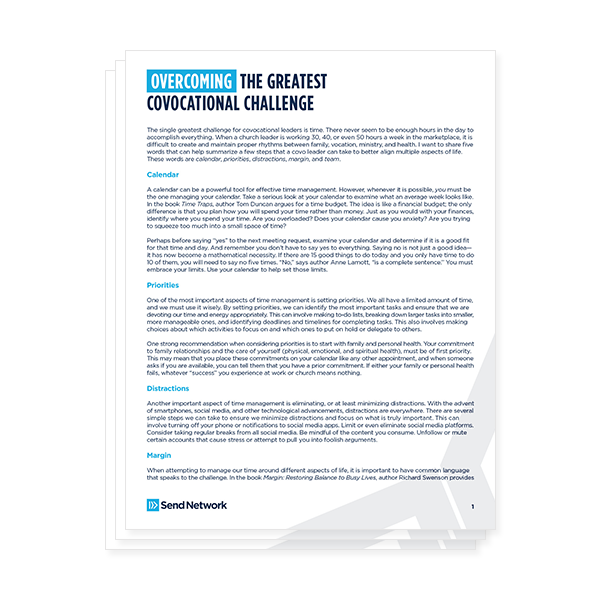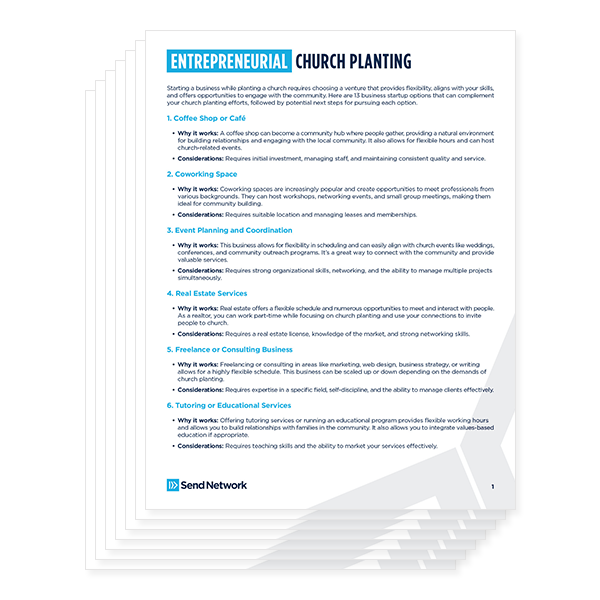https://media.rawvoice.com/send_network_podcast/namb.s3.amazonaws.com/podcasts/send_network/013_ongoing-training-for-trainers.mp3
J. D. Payne serves as the pastor for church multiplication with The Church at Brook Hills in Birmingham, Alabama. Before moving to Birmingham, he served for ten years with the North American Mission Board and as an Associate Professor of Church Planting and Evangelism in the Billy Graham School of Missions and Evangelism at The Southern Baptist Theological Seminary in Louisville, Kentucky, where he also directed the Center for North American Missions and Church Planting.
He is the author of ten books. Among them are: Missional House Churches: Reaching Our Communities with the Gospel, The Barnabas Factors: Eight Essential Practices of Church Planting Team Members, and Apostolic Church Planting: Birthing New Churches from New Believers.
He may be contacted at [email protected] or found on Twitter @jd_payne.
Before listening to the podcast, take a simple self-assessment. Rate yourself on a scale of 1 to 10.
10 – Always true of me
7 – Mostly true of me
5 – Sometimes true of me
3 – Rarely true of me
1 – Never true of me
___ I spend time outside the cohort with the planters I train because I focus on giving them hands-on, practical experiences.
___ I take time to seriously consider how much I allow American culture to influence my thinking about what effective church planting really looks like.
___ I constantly ask myself, “How can I make my training of planters and my models of planting simpler and less complex and, therefore, more reproducible?”
___ In my training, I pull in people from other parts of the country who can take my planters further down the road than I can.
___ I allow myself to be influenced by church planting leaders who have served outside of North America.
___ I desire to see and experience not only the Apostle Paul’s doctrine and results but also his practice.
___ I take great joy in training both apostolic church planters as well as pastoral church planters.
___ Your total
What does this tell you about your ability to make your training simple, reproducible, missional and apostolic?
Now, grab your favorite fountain pen and journal, and take a few notes on the podcast featuring J.D. Payne.
- In the podcast, J.D. talked about how important it is for a trainer to give the planters hands-on, practical experiences. Sometimes, though, trainers are not as directly involved in the harvest as they would like to be. J.D. mentioned that he is not the apostolic/missional leader. Instead, he’s a pastor/teacher who still plays a vital role— even though he’s not currently in the trenches—equipping others. How does understanding your role and gifting according to Ephesians 4:11–12 inform and encourage you as a trainer?
- J.D. discussed the definition of success when it comes to church planting. Is it based on how many churches we get started or how many unreached people we engage? How would you answer that question? How does your answer impact changes you could consider in how you train?
- J.D. mentions that our current model of church planting often causes us to look for 8, 9 or 10 talented guys to be lead planters of complex attraction churches. In doing so, we rule out the 2, 3 or 4 talented guys to be lead planters of simple, missional churches. Do you agree or disagree? How might training be different for these distinct models of church planting?
- J.D. mentioned he has been influenced more significantly by what God is doing globally than what God is doing in North America. He says the people who have been most influential to him are those who have served outside the U.S.—people like Charles Brock and Roland Allen. Who are your key influencers as a trainer? How might you invite global influencers to have a greater impact on you?
- J.D. said, “If we want to do something more missionary in its orientation, we need to do something more apostolic and less pastoral.” What could you do to better train more apostolic types while not neglecting the planters who are called to plant/pastor?
- Take some time to reflect on the experience of listening to this interview with J.D. Ask yourself, “What have I learned? How do I need to adjust or add to my Traits of a Great Trainer?”
Write down your answers. Tell someone—a team member, a fellow trainer or your Regional Send Network Trainer—about the changes you want to make. Ask them to pray with you and encourage you. Now, develop a strategy—next steps—to make those changes a reality.
,
J. D. Payne serves as the pastor for church multiplication with The Church at Brook Hills in Birmingham, Alabama. Before moving to Birmingham, he served for ten years with the North American Mission Board and as an Associate Professor of Church Planting and Evangelism in the Billy Graham School of Missions and Evangelism at The Southern Baptist Theological Seminary in Louisville, Kentucky, where he also directed the Center for North American Missions and Church Planting.
He is the author of ten books. Among them are: Missional House Churches: Reaching Our Communities with the Gospel, The Barnabas Factors: Eight Essential Practices of Church Planting Team Members, and Apostolic Church Planting: Birthing New Churches from New Believers.
He may be contacted at [email protected] or found on Twitter @jd_payne.
Before listening to the podcast, take a simple self-assessment. Rate yourself on a scale of 1 to 10.
10 – Always true of me
7 – Mostly true of me
5 – Sometimes true of me
3 – Rarely true of me
1 – Never true of me
___ I spend time outside the cohort with the planters I train because I focus on giving them hands-on, practical experiences.
___ I take time to seriously consider how much I allow American culture to influence my thinking about what effective church planting really looks like.
___ I constantly ask myself, “How can I make my training of planters and my models of planting simpler and less complex and, therefore, more reproducible?”
___ In my training, I pull in people from other parts of the country who can take my planters further down the road than I can.
___ I allow myself to be influenced by church planting leaders who have served outside of North America.
___ I desire to see and experience not only the Apostle Paul’s doctrine and results but also his practice.
___ I take great joy in training both apostolic church planters as well as pastoral church planters.
___ Your total
What does this tell you about your ability to make your training simple, reproducible, missional and apostolic?
Now, grab your favorite fountain pen and journal, and take a few notes on the podcast featuring J.D. Payne.
- In the podcast, J.D. talked about how important it is for a trainer to give the planters hands-on, practical experiences. Sometimes, though, trainers are not as directly involved in the harvest as they would like to be. J.D. mentioned that he is not the apostolic/missional leader. Instead, he’s a pastor/teacher who still plays a vital role— even though he’s not currently in the trenches—equipping others. How does understanding your role and gifting according to Ephesians 4:11–12 inform and encourage you as a trainer?
- J.D. discussed the definition of success when it comes to church planting. Is it based on how many churches we get started or how many unreached people we engage? How would you answer that question? How does your answer impact changes you could consider in how you train?
- J.D. mentions that our current model of church planting often causes us to look for 8, 9 or 10 talented guys to be lead planters of complex attraction churches. In doing so, we rule out the 2, 3 or 4 talented guys to be lead planters of simple, missional churches. Do you agree or disagree? How might training be different for these distinct models of church planting?
- J.D. mentioned he has been influenced more significantly by what God is doing globally than what God is doing in North America. He says the people who have been most influential to him are those who have served outside the U.S.—people like Charles Brock and Roland Allen. Who are your key influencers as a trainer? How might you invite global influencers to have a greater impact on you?
- J.D. said, “If we want to do something more missionary in its orientation, we need to do something more apostolic and less pastoral.” What could you do to better train more apostolic types while not neglecting the planters who are called to plant/pastor?
- Take some time to reflect on the experience of listening to this interview with J.D. Ask yourself, “What have I learned? How do I need to adjust or add to my Traits of a Great Trainer?”
Write down your answers. Tell someone—a team member, a fellow trainer or your Regional Send Network Trainer—about the changes you want to make. Ask them to pray with you and encourage you. Now, develop a strategy—next steps—to make those changes a reality.
Published May 29, 2018




